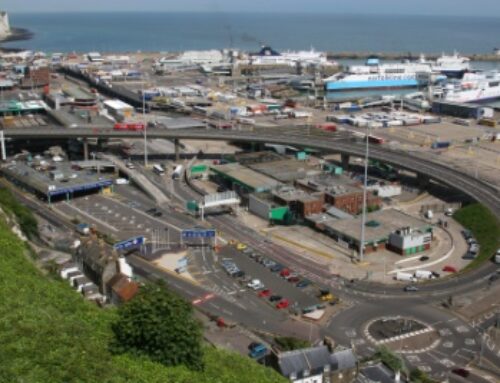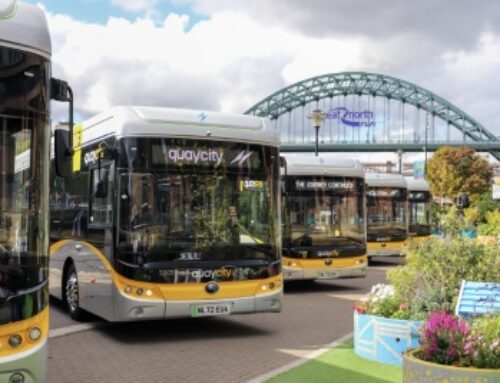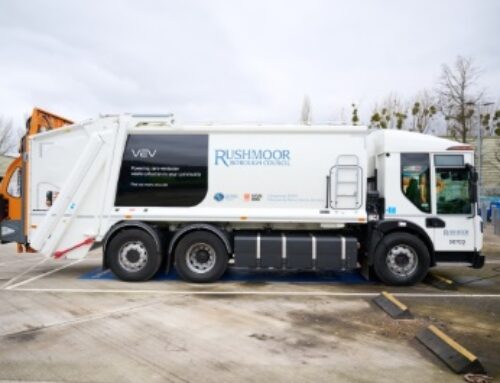Trucks to face new clean air charges in UK cities
 British cities including Birmingham, Glasgow, Leeds and Southampton have published their proposals to tackle atmospheric pollution – and the road transport industry looks set to face significant new charges and restrictions as clean air zones (CAZs) are introduced.
British cities including Birmingham, Glasgow, Leeds and Southampton have published their proposals to tackle atmospheric pollution – and the road transport industry looks set to face significant new charges and restrictions as clean air zones (CAZs) are introduced.
Local authorities have emphasised that stated charging figures may be subject to change, with most of the proposals still pending consultation and review. But they do provide an indication of the kinds of additional costs fleets are likely to face, and have already met with deep concern from some quarters of industry.
In Southampton, the city council’s proposal is for pre-Euro 6 trucks, buses and coaches to be charged up to £100 per day to cross the city’s boundaries. The final figure will be the result of further review and assessment, but charging is expected to commence by the end of 2019.
Certain “mitigation measures” have been proposed by the council to support adversely affected businesses, including potential discounts and exemptions, as well as access to funds to support the replacement of non-compliant vehicles.
Proposals for Birmingham’s CAZ, while also not finalised, have used the London model as a guide, and take vans as well as trucks into scope. According to current plans, it will encompass the area within the city’s A4540 Middleway inner ring-road, but not the ring-road itself. However, it will apply to vehicles crossing the city centre on the A38.
Discounts may be available for local businesses using vehicles that enter the zone more than once or twice a week.
Charges would apply to all heavy-duty diesel vehicles that did not meet Euro 6 emissions standards. Birmingham Council cites charging options based on those applied in London’s ultra low emission zone, with proposed bills for trucks, buses and coaches of between £50 and £100 a day. This will not apply when a vehicle is parked for a day within the zone, but not driven. The scheme will be introduced by 2020.
Leeds is currently proposing a £50 per day charge for non-Euro 6 coaches, buses and trucks. After local businesses voiced concerns, the size of the proposed Leeds CAZ has been reduced – as has the charge, which was originally suggested to be £100 per day.
Lower charges will apply to non-compliant vans, taxis and cars; and the city council suggests charging will be introduced in January 2020.
Grants of up to £19,000 may be available to local operators to install retro-fit kits to older trucks and coaches if Leeds City Council can tap into central government’s £220 million clean air fund.
Road Haulage Association (RHA) chief executive Richard Burnett said the Leeds plans would be: “disastrous for the many operators who are unable to absorb or recover the costs of entering the zone.”
“This is an industry that has to make every penny count,” he continued. “Fifty pounds per day equates to an additional annual cost of £13,000 which will inevitably place many operators in an untenable situation.
“Road hauliers play a key role in delivering and maintaining the Leeds economy. The city council should support them with measures which give them time to upgrade their trucks so they can keep delivering the goods the city relies on. These charges will make vehicle replacement almost impossible.
“What’s needed is an intelligent, phased approach to the CAZ which supports businesses – not punitive charges which have the potential of putting many operators out of business.”
Glasgow is starting to implement its LEZ at the end of this year, focusing first on non-compliant buses: 20 per cent of pre-Euro 6 buses will be banned in 2019, rising to 100 per cent by 2022. This is conditional on the traffic commissioner for Scotland imposing the necessary Traffic Regulation Condition.
Restrictions on other vehicle types, including on trucks and vans, are also expected by 2022. Details are not yet finalised, but non-Euro 6 trucks are likely to be affected.
Martin Reid, RHA policy director for Scotland and Northern Ireland, called for more clarity from Glasgow’s City Council and has stressed the necessity of a phased approach to introduce the scheme, calling the 2022 timescale “completely unreal-istic” for lorries.
He said: “It doesn’t take into account how much it costs an operator to upgrade; there is no retrofit option; and forcing hauliers to replace their trucks sooner than planned is a cost many won’t be able to afford.
“The inevitable result means that owners of the trucks that maintain Glasgow’s economy will be forced out of business.”
The Freight Transport Association (FTA) said that the latest proposals in Leeds and Birmingham had shown “some progress” in the right direction, with significant reductions in the areas covered by the proposed boundaries – but that the schemes would still impact small business significantly.
“CAZs only bring a temporary air quality benefit, bringing forward what was coming anyway,” observed FTA head of UK policy Christopher Snelling.
“We need councils to implement these zones with as much sensitivity to local businesses as possible.”
Andy Dean, a south-coast haulier, said that the projected tolls in Southampton would impact on his business, and many others.
“The average lifespan of a truck is 10 years, so there are still a lot of Euro 5 and Euro 4 trucks on the road. I have been investing in my fleet and have got four Euro 6 trucks, but then I also still have two Euro 5s, and two Euro 4s,” he told Transport Operator.
“The problem is that these tolls will knock the value of Euro 5 trucks back, and inflate the price of Euro 6 vehicles, so it actually becomes more difficult and expensive to get a clean up-to-date fleet.
“The costs could end up far more than £100 a truck a day. A truck which enters the Southampton CAZ to pick up a box in the morning, could well be delivering it to another city with a CAZ in the afternoon…that would be £200 in a single day.
“There’s no way that kind of cost can be passed on, and no way it can be absorbed by a business either. They do need to think again.”
Associated British Ports, which operates the port of Southampton, has put forward its own low-emissions plan, which it says should be sufficient to restore the city’s air quality to legal limits.
It concentrates on the three main sources of NOx within the port: shipping, road and rail transport, and plant and equipment. ABP points out that improvements it has made to the local infrastructure have resulted in an increasing amount of container traffic being transferred from road, but warns that the abolition of subsidies for rail-freight could lead to this being reversed.
ABP has also introduced new traffic management and access around the port to ease congestion, and has a ‘no idling’ policy.
Electric vehicles are being introduced to the ABP fleet. By the year-end 45 per cent of the fleet will be electric, and by 2020 all its vehicles will be electric or hybrid.
ABP points out that 70-80 per cent of the trucks used by hauliers visiting the port are already Euro 6, and it is considering measures to get this figure to 100 per cent as soon as possible. These are likely to include a tariff on non-Euro 6 trucks entering the ABP premises, and a ban on the practice of using old tractor units as trailer tugs around the port.
ABP Southampton director Alastair Welch, told Transport Operator: “A range of alternative proposals are being assessed with a more targeted approach as a way of avoiding the need for the city to introduce a blanket charge.
“Our air quality strategy sets out a package of proposals which we feel will continue the trend of reducing emissions in the city without the need for a city-wide charging regime. Any revenue raised by this proposed charging would be invested into new environmental initiatives.”
Operator: ‘city could come to a halt’
Southampton container specialist Ian Daish says the city council’s plans are unworkable and unacceptable, and he is concerned that the proposals are a done deal in spite of promises about the consultation.
“I can see hauliers blocking the streets of Southampton if this goes ahead as proposed,” he warned.
“The city could come to a halt.
“London implemented its Low Emissions Zone incrementally, but here we’ve got a city with a container port which is going from nothing to the strictest standard in one step. No container port in the world has tried this, and I don’t think the city council understand the implications,” he said.
“About 40 per cent of the trucks on the road are Euro 5. That number is falling all the time, as is evidenced by improving air quality in Southampton and other cities, as they are replaced by Euro 6 vehicles.
“But that change can’t be made overnight. If a small or medium-size haulier buys a new truck, then that’s with the expectation that it will be run for up to five years on finance, during which time it pays for itself, then for up to another five years in which it makes a profit for the operator. Chopping them out of the fleet at five years or less is an economic non-starter.”
Mr Daish points out that the impact will go beyond transport operators.
“There are 12 truck workshops within the proposed area, and most of their custom is older trucks, together with numerous parts factors and so on. There are also four franchised main dealers. All of those businesses, and their employees, are now under direct threat.
“If the city council could just delay things by a couple of years, most older trucks would have been replaced anyway,” he said.
Speaking of the potential impact on his own business, he added: “My designated operating centre is in a yard in the zone on the western approach: I’m legally obliged to park my trucks there. My fleet consists of five trucks: two are Euro 3, and are fully-depreciated and are due for change anyway.
“But the remainder are Euro 5, and there’s no way that I can change them yet. I’ve also got seven dedicated sub-contractors. One has a Euro 6 truck, but the rest are all Euro 5. You can see what the impact on the business will be, and it’s not pretty. The only way out is for haulage rates to rise with a consequential knock-on for consumer prices.”
He emphasises that he is not opposed to having clean air in Southampton.
“My own family has been here since 1535. I can see the dockyard cranes from my bedroom window. I care about Southampton more than most. But what’s being proposed here will kill the city, if the city council isn’t careful.”












